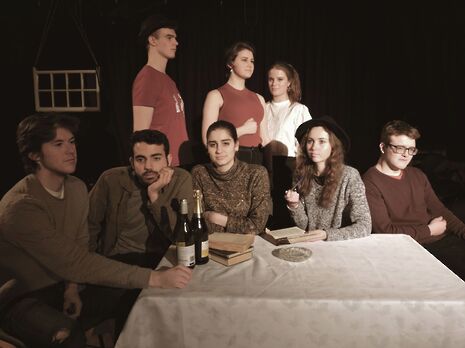Total Eclipse preview: ‘overflowing with anger, trembling with violence’
Verlaine and Rimbaud come to Pembroke New Cellars for this intimate exploration of the private relationship between the two poets

19th-century France. Two French poets: one, a married radical, the other, young and stubborn, by 17 years old one of the best poets the French language has ever seen. They begin a volatile affair, poisoned by the taste of absinthe.
Harry Orwell (Verlaine) describes to me the hardest part of acting in this piece, aside from having to be consistently drunk, the difficulty lies in the paradox of his character: these two poets, in their own different ways, are some of the worst examples of human beings, yet the audience winds up feeling sympathy for them. In Total Eclipse this explosive relationship is represented as it is, not how we would like it to be – and this realism can at times be agonising.
The cast describe the play as “bed-centric”, the audience’s gaze focused entirely on the two poets, the other characters swirling around them. Verlaine’s wife is displaced by the younger boy, their heterosexual relationship eclipsed by the intense emotions of the pair. The atmosphere in Pembroke New Cellars flits between intimacy and distance, as the stage creates two spaces for the action, one nearer the audience, involving them in the two-way dialogues, the other keeping the audience at bay, opening this very private relationship into the wider world. Live piano music accompanies these temporal and spatial transitions.
A need for discretion hangs over this play like a fog. Rimbaud’s mother and sister demand this after his death, trying desperately to remove his ‘profane’, youthful publications from the public eye, censoring his poetic word. They are swelling with bitterness about Verlaine, about absinthe and about the anger, and by destroying the poetry from this time perhaps they can forget about what happened. But it is Verlaine who holds the manuscripts, who stands firm and defends the poetic vision. The manuscripts become a symbol of the poet’s self, of his emotions, and this profanity is exactly an expression of Rimbaud’s feelings, his sense of the world – to deny these poems publication would be dishonest. Verlaine refuses to shape a man through another’s ego.
This is a play overflowing with anger, trembling with violence and secret sexuality, verging on the edge of the fatal – and at the end of the play the characters are left exhausted. Verlaine is a shell of himself, a distinguished poet fallen from his former glory, a testimony to a dying generation of poets. Rory Russell and Daisy Adams’ direction focuses on where to pause, on the line between speech and silence, of what is said and what hangs in the gaps. This is a play about what can and cannot be said, and where suppression of voice is inevitably and terrifyingly dangerous.
Total Eclipse is on at Pembroke New Cellars 6-10 March
 News / Christ’s announces toned-down ‘soirée’ in place of May Ball3 February 2026
News / Christ’s announces toned-down ‘soirée’ in place of May Ball3 February 2026 News / Right-wing billionaire Peter Thiel gives ‘antichrist’ lecture in Cambridge6 February 2026
News / Right-wing billionaire Peter Thiel gives ‘antichrist’ lecture in Cambridge6 February 2026 News / John’s duped into £10m overspend6 February 2026
News / John’s duped into £10m overspend6 February 2026 News / Epstein contacted Cambridge academics about research funding6 February 2026
News / Epstein contacted Cambridge academics about research funding6 February 2026 News / Corpus FemSoc no longer named after man6 February 2026
News / Corpus FemSoc no longer named after man6 February 2026









